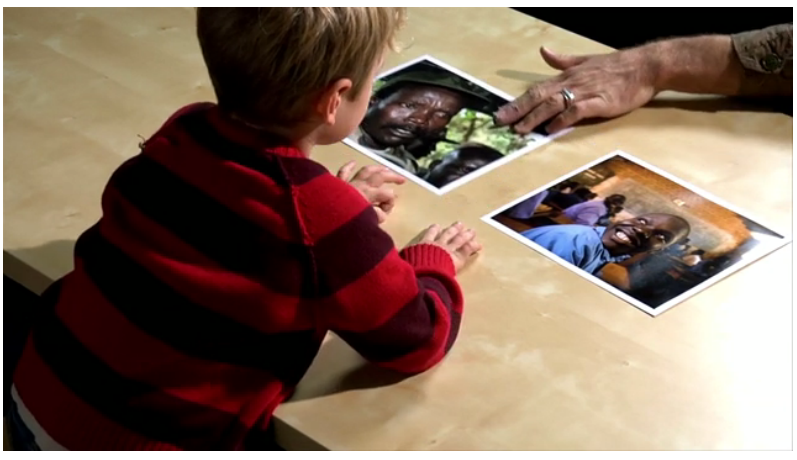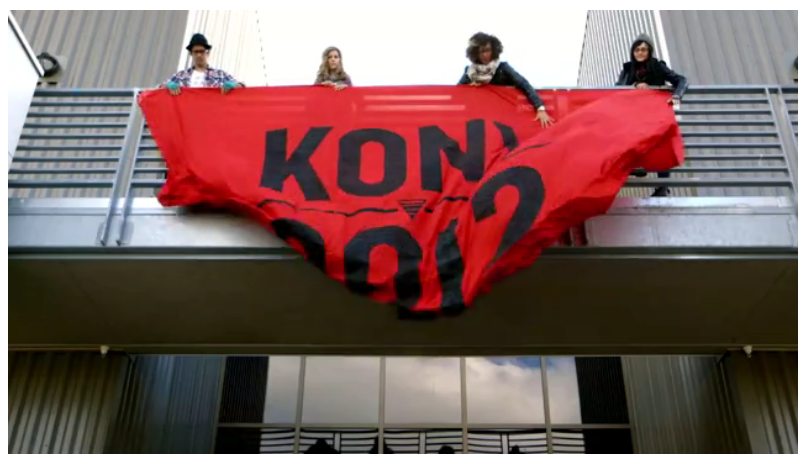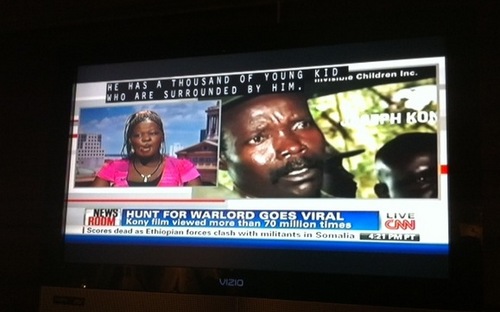Can the subaltern speak? No, but she can certainly sob, with tears of raking loss and, a few rapid film cuts later, tears of heartwarming gratitude. I learned that much watching
Kony 2012 this morning, even if, like most people from the region, I learned little else by way of information or context.
Why did I wait so long to actually watch the film I’d been stewing about for the last week? I actually started to watch once, but was foiled by a bad Internet connection and the off-putting opening sequence (which resembles an ad for Facebook or Google more than a documentary about Uganda). And in a way, these obstacles told me something. I am not the target audience for this film. American youth with ubiquitous, high speed internet access willing to watch 30 minute films on computer screens, cell phones and (probably soon?) wristwatches are. But my exclusion from the film’s emotional community isn’t about age or tech savvy, but because I’m an African who happens to be neither a victim nor a villain, and simply doesn’t fit into either the audience or the subject matter of this overnight, worldwide success.
The almost uniformly ticked-off reaction of Africans like
Rosebell Kagumire (above),
Maureen Agena,
Teju Cole — at least those Africans not on the payroll of
Invisible Children — must seem like a bizarre and offensive form of ingratitude to those Americans caught up in the enthusiasm to “make Joseph Kony famous.”
If I had to sum up our bad attitude it would be thus: We feel like the vision of the world acting in unison extolled in the film Kony 2012 doesn’t include us.
After all, the film tells its viewers that no one knew or cared about the Lord’s Resistance Army before three twentysomethings from California stumbled upon some terrorized children sleeping outdoors. Kony 2012 doesn’t imply that Kony is still in Uganda, as some critics have claimed. But it does recycle powerful but outdated imagery from their earlier films about Northern Uganda. It does make exaggerated claims for the leading role of Invisible Children in the peacemaking and post-conflict process (taking full credit, for instance, for the recent deployment of 100 US military advisors to Uganda). And it does assert that only continued US intervention now — compelled by a worldwide youthful grassroots mobilization — can end the regional conflict by “arresting” Kony.
But it’s not the questionable geopolitical analysis of the film that gets to me so much as its
affect. Those who haven’t been able to bear the thought of watching it really should make themselves, if only to grapple with the escalating power of images to affect us. It is that power that makes the informed, learned critiques irrelevant, as both
the filmmakers and
Noam Cohen in today’s New York Times make clear. Cohen casts this irrelevance in the familiar frame of obscure complexity versus compelling simplicity. But the truth is that emotions can be as complex as ideas. And it took
Invisible Children, Inc. years to craft the sophisticated images and participatory campaigns they have mobilized, as a viewing of the evolution of their prior efforts shows. Simplicity has nothing to do with it.

So, while I do have an informed, professional response to the claims made by Kony 2012, but that response is short circuited by my feelings at seeing East and Central Africa explained by showing two mugshots to an adorable blond boy from San Diego: a good African victim and a bad African warlord. The film expects its audience to identify with the little blond boy. Indeed, it obliges it to. Africans however, must identify with those flat images on the table. With Jacob Acaye the former child soldier, yes, but with Joseph Kony too. We know that these are two side of a single coin, and that when we are seen as the one, the face of the other is always lurking beneath.
Still, once I finished watching the film I abandoned self pity and
ressentiment. This is a trap for the contemporary African subject. After all, we are wired into the same communications networks and feedback loops of emotional intensity as everyone else. We are no longer colonial mimics, calculating how best to reflect back Western ideas and images for our own ends. We are now all neoliberal perverts, in the sense of perversion developed by the critic Slavoj Zizek, perversion as the “
inverted effect of the phantasy.” Sounds “complicated” and maybe it is.* But insofar as films like Kony 2012 invite us to see ourselves in the gaunt visage of a horror film monster like Joseph Kony — who acts at the direction of no cause, not even his own, but at the command of the Lord — and then to reflect back that image in a bizarre, pseudo-Situationist campaign to emblazon his name and image everywhere, from streetlamps and public monuments to our laptops, cellphones and bodies, I think we get the point.

The objective today is not to give Africa its voice but to traverse the fantasy that “voice” can endow us with agency in a society controlled by the imperatives of war and capital.
Footnotes:
* For those interested, I develop an account of perversity in the global circuits of vicarious participation in Africa’s crises in this forthcoming article (you can read uncorrected page proofs here).
